

TokyoCinema films and video available in VHS NTSC and PAL cassette
in English narration
The latest production
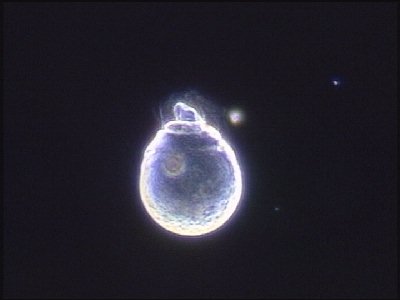
THE SEA IN THE SEED Sperm of Ginkgo biloba and Reproductive Evolution in Plants
Awarded THE BEST RESEARCH FILM at 21th UNICAJA
Scientific Films Biaennial, Ronda, Spain
In 1986, HIRASE Sakugoro found sperm of Ginkgo
biloba and this discovery filled a missing
lynk in evolution of plants. A century later
Japanese botaists realized to observe whole
process of reproductive sceans in moving
images using carefully treated living specimens
starting premitive unicelluar algae Mesostigma
to Angiosperms, Torenia. This video introduces
some the first ever captured shots in video
timelapse: How female Gingko tree capture
the polen. Growth of Gingko sperm inside
the polen tube. Full process of doubled fertilization
in Torenia.
Prod. 2000 color. 35min.
The price for individual users USD250 and
institutional users USD500.

LIFE OF THE FRESHWATER SPONGE
Awarded THE BEST RESEARCH FILM at 19th UNICAJA
Scientific Films Biaennial, Ronda, Spain
Sponges, previously classified as Parazoa,
which demonstrate characteristics of unicellular
organisms, are now shown to have some features
of true metazoans. Uses time-lapse photography
to show sponges’ water purifying function,
how their cells aggregate in a multicellular
form because dissociated sponge cells cannot
survive individually, and how sponges can
distinguish themselves from others. Shows
examples from Ephydatia fluviatilis..
Prod. 1996 color. 28 min.
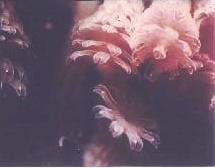
MOON JELLY
Complete life cycle of the common jellyfish, Aurelia aurita.was recorded by time-lapse in 16mm color
film.
Prod. 1977 color, 33min.
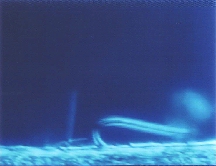
WHERE THERE IS LIFE, THERE IS MOTION PART1
The function of microtubules
Studies the structure and function of microtubules highlighting the distinction
between muscle movement and movement apparent in microtubules. Shows flagellar
and ciliary movement in protozoa and higher organisms, e.g. chlamydomonas,
paramoecia, euglena, mytilus. Experiments with methylene blue are shown
as evidence of ATP synthesis and action. Electron micrographs and models
are used to demonstrate the structure of microtubules. Experiments on individual
flagellae are shown with ATP being applied to certain portions of flagellae;
the results are shown in slow motion. Axopodia are shown in heliozoans
with illustration of their operation and function.
Prod. 1979. color. 26 min.

WHERE THERE IS LIFE, THERE IS MOTION PART2
The role of microfilaments in cell motility
Uses research film footage shot in laboratories by eminent specialists
involved in cell motility studies. Opens with a brief summary of muscle
movement and the roles of proteins actin and myosin. Creatures without
muscles are examined ? Amoeba proteus, Pelomyxa, algal cells from the Characeae
group such as Nitella and Chara. The slime mould Physarum polycephalum
is also examined. Experiments on protoplasmic streaming are shown as well
as evidence for the role of microfilaments in motility.
Prod. 1982. color
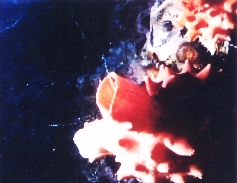
Developmental biology of an ascidian: Halocynthia
roretzi
Shows the life cycle of the sea squirt Halocynthia
roretzi. Halocynthia adults from Mutzu Bay
in Northern Japan are shown to spawn at a
certain time of the day and differences in
spawning time have been used to define three
sub-species. Shows in great detail the fertilization and
development of an egg through to the larval
form. Metamorphosis follows and development
is shown up to maturity and the adult form.
The importance of this group for developmental
biologists is in the larval stage where the
animal develops a notochord and a swimming
tail. In Japan Halocynthia is farmed for
food, and sequences in the film show fishermen
harvesting the adult animals. Prod. 1982.
color. 23 min.
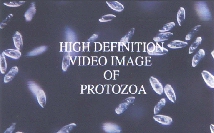
HIGH DEFINITION VIDEO IMAGE OF PROTOZOA
This is the first our experience of shooting
by HDTV fo micrography.
Prices except new Ginkgo video: US$200.oo
per video copy for individual users and US$400.oo
for Institutional users who provide lending
services in VHS.
Other TokyoCinema products are also available
in video, however many TV programs are not
for foreign audiences and Japanese narrations
only. Video copies of pictures produced by
old Tokyo Cinema Co., Inc. is also available.
There are certain titles which already
transferred to Betacam SP video, much
easier to make a VHS cassette, however those
are 30% of the products.
Theoretically all of the listed titles in this home page are available,
however we must transfer the video copy from 35mm original negatives.
Tokyo Cinema films available in video
with English narration:
THE WORLD OF MICROBES
MARINE SNOW
THE WORLD OF PULSES
SELECTED LACTOBACILLUS
Order mail to info@TokyoCinema.net
TokyoCinema Inc, 302, 7 Ichigaya-Tamachi-2, Tokyo-162-0843 JAPAN
phn: +813-3269-6751 fax:+813-3269-6746
started 1999.04.02.
final update 2001.08.16.